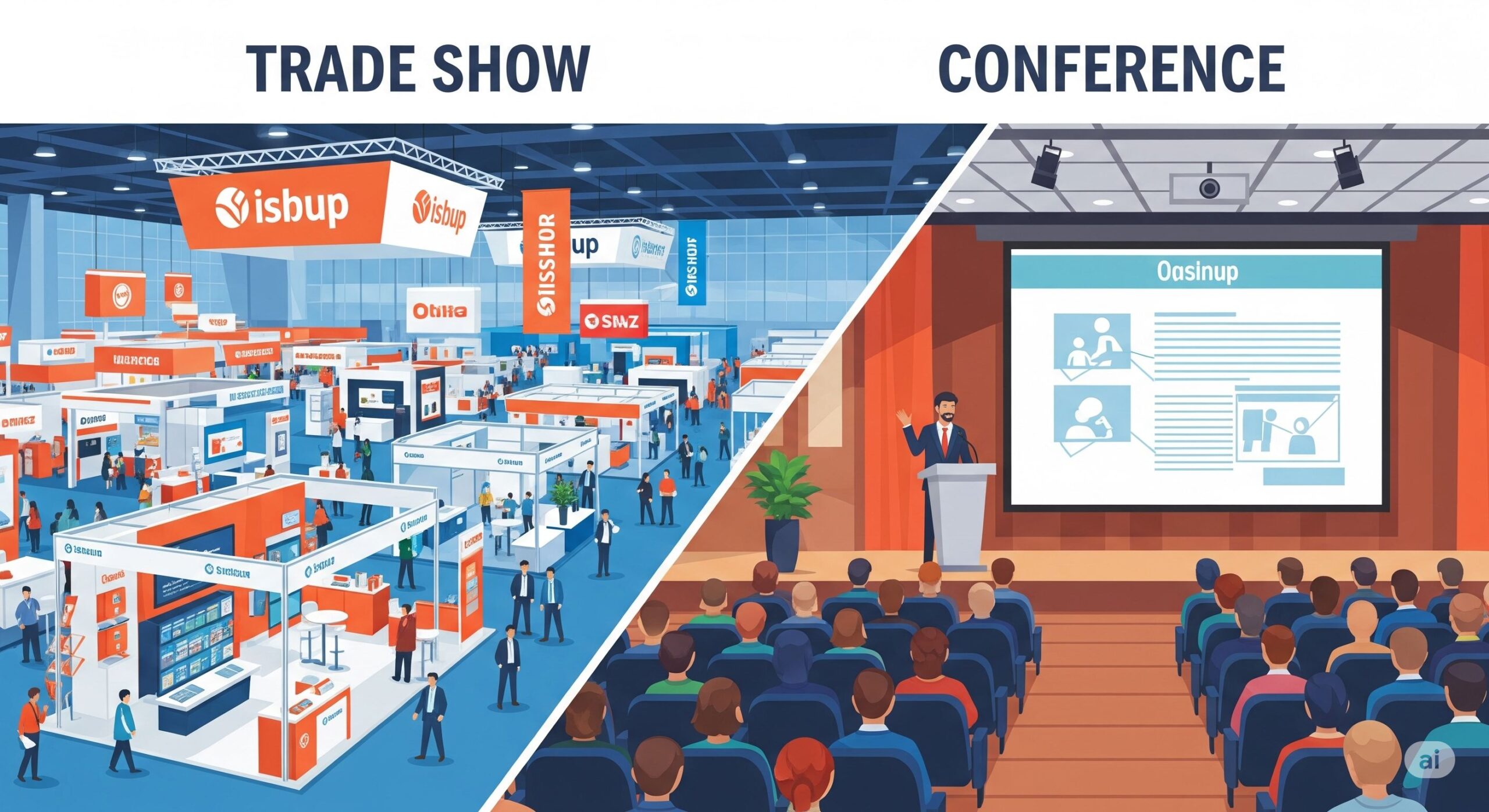Trade Show vs. Conference: What to Expect from Each Event Type

Attending a trade show, checking out a conference, or waiting for a virtual pass. Does it sound familiar? For businesses, these terms often get tossed around like they mean the same thing. Spoiler: they don’t. Understanding the basic difference between a trade show vs. conference is vital for maximizing your return and achieving specific objectives. Each event type offers a different experience and caters to different needs. Let’s dive into what separates these gatherings.
When you’re deciding your company’s gathering type, the choice between a trade show vs. conference is not just a matter of their names. It’s a carefully thought decision that shapes your interactions, leads, and brand placement. Are you looking to display a new product, or are you trying to position your company as an industry leader? The answer lies in your specific want.
The World of Trade Shows: All About Them
A trade show, at its core, is a marketplace. It’s where businesses in a specific industry gather to exhibit their products and services to an interested audience, typically other businesses. The atmosphere is often vibrant, bustling with activity, and focused on demonstrations and immediate connections.
What Truly Defines A Trade Show?
Here is a point-by-point description of what constitutes a trade show:
Product-Centric Focus: Companies set up booths, often elaborate and attention-grabbing, to display their latest offerings. It can be considered a grand stage for product launches, live demonstrations, and hands-on experiences. Attendees are there to discover, evaluate, and procure solutions.
B2B Interactions: While some trade shows might have a consumer base, the vast majority are business-to-business (B2B). Decision-makers, buyers, suppliers, and industry professionals are the primary attendees, all focused on forming commercial relationships.
Networking with an Objective: Conversations frequently revolve around product features, pricing, integration, and partnership opportunities. One might find themself discussing supply chain logistics with one person and a new software solution with another, in a quick manner.
Demonstrations and Pitches: Expect to see products in action. Companies invest heavily in creating demos that highlight the value of their offerings.
Targeted Audience: The audience at a trade show is specific to the industry it serves. If you are exhibiting, you’re reaching people who are already actively looking for solutions in that industry, which can bring in high-quality leads.
The Intellectual Hub: Conferences and the Exchange of Ideas
Now, let’s shift to conferences. When you attend a conference, the objective changes significantly. Conferences aren’t just about what you can get right away. They’re places to share ideas, learn new skills, and connect with others in your field on a more meaningful level. Here’s what makes them special:
Content: Conferences are built on educational content. Keynote speakers, panel discussions, workshops, and breakout sessions are the components of a conference. Experts share insights, research findings, best practices, and future trends. Attendees are there to learn, absorb new information, and enhance their skills.
Thought Leadership: For businesses, a conference offers an opportunity to establish thought leadership. Sponsoring a session, having an executive speak on a panel, or even presenting a research paper can significantly boost your brand’s credibility and influence within the industry.
Networking for Growth: The primary goal of networking at a conference is about building relationships, collaborating on ideas, and connecting with mentors or potential partners, and sales is usually the secondary outcome.
Broader Audience, Deeper Engagement: Conferences often attract a wide variety of professionals, including academics, researchers, and even students. The engagement is typically more intellectual, developing a sense of community and shared learning.
Professional Development: Many attendees come to conferences specifically for professional development units or certifications. The focus is on upskilling, staying current with industry advancements, and gaining new perspectives that can inform their work.
The Evolving Landscape: Hybrid and Virtual Events
The world of events has transformed, especially in recent years. A virtual conference, for instance, takes place entirely online. This offers accessibility and can reduce costs associated with travel and logistics. However, it can sometimes lack the immersive quality and interactions of an in-person event.
Similarly, a virtual trade show recreates the exhibition hall experience in a digital environment. Virtual booths allow companies to display products through videos, interactive demos, and downloadable content. It’s a cost-effective way to reach a global audience and gather data on attendee engagement.
The hybrid conference and hybrid trade show are the best of both worlds, offering a dynamic blend of in-person and online participation.
For a quick and easier understanding of both of them, this table sums up the Trade Show vs. Conference difference.
| Features | Trade Show | Conference |
| Focus | Product showcasing and lead generation | Knowledge sharing and collaboration |
| Attendees | Buyers, Retailers, Suppliers | Academics, Professionals, strategists |
| Format | Booths, Exhibits, Live demos | Panels, Keynotes, Breakout Sessions |
| Goals | Selling, Branding, Distribution | Learning, Networking, Professional growth |
| Environment | High energy, promotional | Academic, insightful, Structured |
Conference vs Trade Show: Making the Right Choice
Trade shows are great if you want to get leads, display new products, meet possible customers, and increase sales. But if you are looking to be seen as an expert, learn what’s happening in the field, network, and see what’s coming up, a conference is a better choice. Keep in mind that some events mix the two, offering both exhibit areas and learning sessions.
Of course, some events combine elements of both, often featuring an exhibition hall alongside educational content. These integrated events can offer an all-inclusive experience, allowing businesses to achieve multiple objectives. Evaluate your needs, understand the audience your event attracts, and then choose whether a Conference vs Trade Show aligns the most with your vision.

